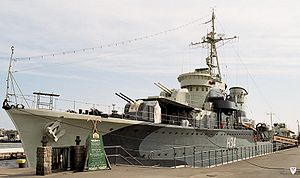| ORP Błyskawica | |
|---|---|
 ORP Błyskawica, modern view | |
| Career (Poland) | |
| Name: | ORP Błyskawica |
| Namesake: | lightning |
| Laid down: | September 1935 |
| Launched: | October 1, 1936 |
| Commissioned: | November 25, 1937 |
| Decommissioned: | May 1, 1976 |
| Honours and awards: |
|
| Fate: | Museum ship |
| General characteristics | |
| Class & type: | Grom-class destroyer |
| Displacement: | 1,975 tons standard |
| Length: | 114 m (374 ft 0 in) |
| Beam: | 11.3 m (37 ft 1 in) |
| Draft: | 3.3 m (10 ft 10 in) |
| Speed: | 39 knots (72 km/h/45 mph) |
| Complement: | 192 |
| Armament: |
1937: |
ORP Błyskawica is a Grom-class destroyer which served in the Polish Navy during World War II and is the only ship of the Polish Navy awarded the Virtuti Militari medal. It is preserved as a museum ship in Gdynia, the oldest preserved destroyer in the world.
She was the second of two Grom-class destroyers, built for the Polish Navy by J. Samuel White, Cowes in 1935–37. The name means Lightning. The two Groms were some of the most heavily armed and fastest destroyers on the seas before World War II.
Operational history[]

Two days before the war, on 30 August 1939, the Błyskawica withdrew, along with the destroyers Grom and Burza, from the Baltic Sea to Britain in accordance with the Peking Plan to avoid open conflict with Germany and possible destruction. From then on they acted in tandem with the Royal Navy's Home Fleet. On 7 September 1939, Błyskawica made contact with and attacked a U-Boat, possibly the first combat between the Allied and the German fleets.
In early May 1940, Błyskawica took part in the Norwegian Campaign, shelling German positions and downing two Luftwaffe aircraft. Her sister ship Grom was bombed and sunk during the campaign. Later that month, she took part in covering Operation Dynamo, the successful Franco-British evacuation from Dunkirk.

ORP Błyskawica in the Northern Atlantic during World War II
During the rest of the war, Błyskawica took part in convoy and patrol duties, engaging both U-boats and the Luftwaffe in the Atlantic and Mediterranean. In 1941 her 120 mm guns were replaced with British four-inch (102 mm) anti-aircraft guns. The ship was also given escort duties for troop transports, notably RMS Queen Mary, being one of the few ships that could keep up with the liner.
On the night of May 4–5, 1942, Błyskawica was instrumental in defending the Isle of Wight town of Cowes from an air raid by 160 German bombers. The ship was undergoing an emergency refit at the J. Samuel White yard where she was built and, on the night of the raid, fired repeated rounds at the German bombers from outside the harbour, her guns becoming so hot they had to be doused with water. Extra ammunition had to be ferried over from Portsmouth. This forced the bombers to stay high, making it hard for them to target properly. The ship also laid down a smokescreen hiding Cowes from sight. The town and the shipyard were badly damaged, it is generally thought[citation needed] that without this defensive action, it would have been far worse. In 2002 the crew's courage was honoured by a local commemoration lasting several days to mark the 60th anniversary of the event. In 2004 an area of Cowes was named Francki Place in honour of the ship's commander. The Isle of Wight Council has approved the idea of having the Błyskawica return to Cowes in 2012 to celebrate the 70th anniversary of the event and 75 years since the ship's commissioning.[1]
In March 1943 Błyskawica replaced HMS Lightning, which sunk on 12 March 1943, in Cruiser Force Q based in Bône, North Africa. On 8 June 1944, Błyskawica took part in the Battle of Ushant against Kriegsmarine destroyers.
During the war, she logged 146,000 nautical miles (270,000 km) and escorted eighty-three convoys. In combat she damaged three U-boats, helped sinking other ships and shot down at least four aircraft.

Bridge of ORP Błyskawica decorated with Golden Cross of the Order Virtuti Militari
In late 1945 and early 1946, the Błyskawica along with the destroyer HMS Onslow took part in Operation Deadlight, the scuttling of over 100 German U-Boats.
After the war, she returned to Poland. Since 1 May 1976, she has served as a museum ship in Gdynia, replacing Burza. In July 2006, Błyskawica was "twinned" with the Canadian destroyer HMCS Haida in a ceremony in Gdynia. Both ships served in the 10th Destroyer Flotilla during World War II. The ceremony was attended by former crew members of both ships and the general public. A similar ceremony took place in Canada with HMCS Haida in 2007. In November 2007 she was awarded the International Maritime Heritage Award of the World Ship Trust.
See also[]
References[]
- ↑ "'Heroic' Warship set for 2012 reunion". Isle of Wight County Press. 2007-12-17. http://www.iwcp.co.uk/news/heroic-warship-set-for-2012-reunion-18524.aspx. Retrieved 2013-04-06.
External links[]
| Wikimedia Commons has media related to ORP Błyskawica. |
- ORP Blyskawica timeline, photos and a video of her in action
- Cowes street named after Commander of ORP Blyskawica
Coordinates: 54°31.171′N 18°33.071′E / 54.519517°N 18.551183°E
| ||||||||
The original article can be found at ORP Błyskawica and the edit history here.